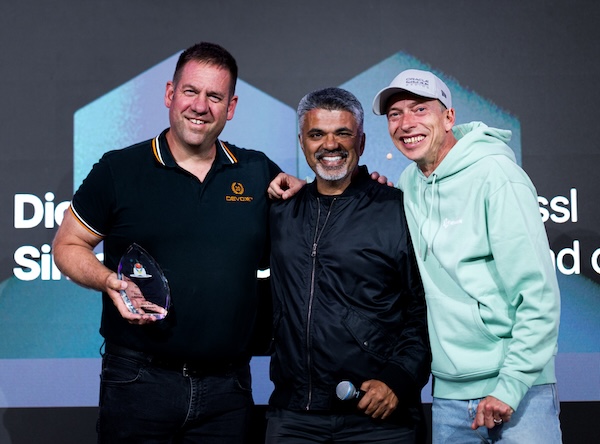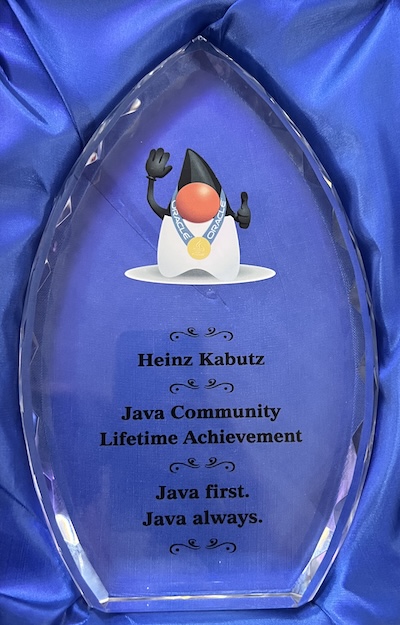325Be a Distinguished Java Engineer in the Age of Vibe Coding
Author: Dr Heinz M. KabutzDate: 2025-05-31Java Version: 25Sources on GitHubCategory: Inspirational
Abstract: We are all amazed how AI can help us in everyday tasks. It can even write Java code. But "Show me the Pull Requests" (Evans) sums it up nicely. We do not (yet) see AI massively improving open source projects.
Welcome to our 325th edition. Sharat Chandar surprised me at Devoxx UK by honouring me with a Java Community Lifetime Achievement for The Java(tm) Specialists' Newsletter. This achievement is not just for me, it is for our entire community of readers. You have been so faithful and kind, reading it for decades, and supporting me and my Java Specialists Training. Thank you!

Heinz Kabutz, Sharat Chandar (Senior Director @ Oracle), Mark Hazell (Founder Devoxx UK)

This should be a floating trophy to spend one day in each newsletter subscriber house
I attended four excellent Java conferences in May. What is my takeaway from the conferences? First off, I am blown away by the reception I get everywhere. The rooms are not only full, they are bursting at the seams. And this is for a topic that would be considered "fringe" at best: The Hidden Art of Thread-Safe Programming: Exploring java.util.concurrent".
The conferences had a lot of AI talks, and the more I look at it, the more I believe that as advanced Java programmers, we have to up our game if we want to stay relevant in this industry. AI is great at introductory and even some intermediate coding, but it struggles with those topics that programmers find hard too, such as coming up with new algorithms, clever concurrent code, good design, etc. And this brings me to the topic of this, hopefully inspirational, newsletter.
javaspecialists.teachable.com: Please visit our new self-study course catalog to see how you can upskill your Java knowledge.
Be a Distinguished Java Engineer in the Age of Vibe Coding
As software engineers, we are sitting on the edge of a precipice. The climate feels like it did in the middle of 2000. Then, companies had spent billions getting ready for Y2K. Through very hard work, we managed to avoid a world-wide computer meltdown. It came at huge cost to the companies. And when the dust settled, programmers who had been demanding a salary of $250k fixing COBOL code, were out of work.
2025 feels similar, but we've been hit with a double-barrelled shotgun. First off, we've come through a near-catastrophe with the global lockdown. Companies invested heavily in IT to automate and become more virtual. Most of our Java careers blossomed in 2020-2023. But as in the year 2000, companies got exhausted paying our salaries, and layoffs began. The mass purge began with Twitter, and many other large employers have followed suit.
Then the second issue is that generative AI. It is always right around the corner. Any day now. It reminds me of the Heinzelmännchen (no relation ;-)) These little gnomes would come out at night and do the work of the citizens of Cologne. One night the tailor's wife became curious and left some dry peas out. The gnomes slipped and fell and this woke up the wife who then saw them. They were furious at this, and never returned. After this, the citizens of Cologne had to do their chores themselves. We all desire Heinzelmännchen to do our work for us.
There is a cost, and this might not be obvious to the "bean counters" at the moment. We are losing a generation of programmers, since AI is quite good at beginners code. Without new programmers coming through the trenches, things will look dire in a few years. Thus if we can "hold our breath" and survive the upcoming career drought, we will have a huge advantage. We are senior Java programmers. A lot of our colleagues will switch careers. The younger coders are often seduced by how fast "vibe coding" is. Ben Evans asked the question: Show me the Pull Requests. Those who remain will get some very interesting opportunities, because there are billions of lines of Java code out there running our world. Look at those who are still maintaining COBOL systems in 2025. They are having far too much fun to retire.
What can we do? We need to focus on those things that are hard. Design, concurrency, performance, algorithms. My current focus is on concurrency, and I've continued recording my "Teardown" series. You should pick whatever you find most interesting, and become laser focused on that.
At the moment, companies are still spending money on training their programmers. They have a budget that they need to use up. Use it or lose it. But they want to see results. They are not interested in buying a course, for you to never attend it. This is why we always do a roll-call in a live class. However, it is much easier to "not" attend a self-study class. The most common question I get from new customers is: "Can we get a course completion certificate?" I've always offered these for some of my courses on my online school platform, but now we do it for all. Our system sends your completion certificate automatically when you finish watching a course.
We also have more comprehensive "Specialist" and "Associate" certificates. For these, you have to watch the course, and then you also have to submit the exercises to us for marking. This is the best way to prove to your employer that they have gotten good value for money.
For example, we have our Java Concurrency Specialist Certificate. This takes about 8 days of study to get through, of which 30% would be doing exercises. If 8 days sounds too long, we also have the lighter Java Concurrency Associate Certificate. This takes 2 days. Students can upgrade from their "Associate" to "Specialist" certificate.
Best of all, right now we are not going to charge anything for these certificates, even though it takes me a lot of time. I will read your exercise solutions and provide feedback. It is like a normal classroom course, except a bit more asynchronous.
For those who do not want to click on links in emails, please head over to javaspecialists DOT eu SLASH courses SLASH teachable and you'll see all the different certificate options there. Here is a list:
- Java Concurrency Specialist Certificate (8 days)
- Java Concurrency Associate Certificate (2 days)
- Java Language Specialist Certificate (10 days)
- Java Language Associate Certificate (6 days)
- Java Design Specialist Certificate (9 days)
- Java Design Associate Certificate (5 days)
- Java Data Structures Specialist Certificate (5 days)
- Java Data Structures Associate Certificate (2 days)
- Java Developer Productivity Specialist Certificate (2 days)
- Java Superpack Mastery Certificate (25 days)
This is the time to invest in our core Java specialist knowledge.
Kind regards
Heinz
Comments
We are always happy to receive comments from our readers. Feel free to send me a comment via email or discuss the newsletter in our JavaSpecialists Slack Channel (Get an invite here)
Related Articles
Browse the Newsletter Archive
Java Training
We deliver relevant courses, by top Java developers to produce more resourceful and efficient programmers within their organisations.


